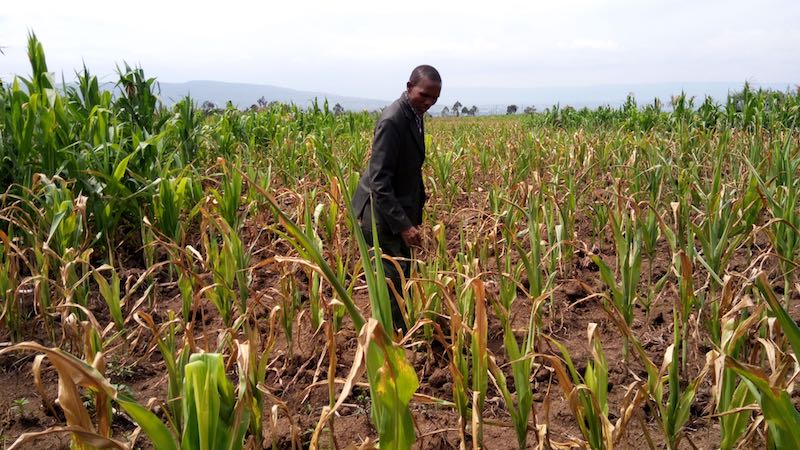Carringtone kinyanjui

Farmer inspecting his farm which has been affactec by drought. Photo courtesy.
About three months ago, I got the opportunity to attend a meeting organised by the Kenya National Commission of Science and Technology. It was planned to set research priorities for Kenya for the year 2018/2019. While in a plenary session, a senior government official asked why Kenya should invest in Satellite Technology and yet we still have people dying hungry in Kenya. Before you make quick judgements on the official, I should inform you that he has a PhD in Nuclear Science. He clearly is not ignorant.
I laughed off the question, but considered it as I went home. Like any student of science, I tried to find the answer by asking a more fundamental question: Why did some Kenyans sleep hungry last year? The easy answer to this is that Kenya, like any African country, is poor. I had however long rejected this position. I had come round to the fact that Africa’s economic and political systems are the most responsible for its current state. The detailed discussion of Africa’s systems is out of the scope of this article. However, it helps to understand that Africa is not poor, it’s just poorly organised.
RELATED ARTICLE: Rising temperatures will push millions of people in Africa into poverty and hunger unless governments take swift action
Why?
Why were Kenyans hungry last year? Because there wasn’t enough food in the market.
Why wasn’t there enough food in the market? There wasn’t enough food produced.
Why wasn’t more food imported to cover the decline in production? Because government agencies were not aware there was suppressed food production. In fact, the Minister of Agriculture said that there was a bounty harvest: there was enough maize in the country to last Kenya six months (It lasted us three months at most).
Why did the minister lie in public television? Because he’s a politician (chuckle). Seriously, probably because he was also misinformed.
Why was he lied to? The people working for him had poor data, so they probably made projections. These projections turned out to be catastrophically wrong.
Wait, a government agricultural agency had poor data? Why? Well, because Kenya is this very huge land mass. You can’t just go round asking farmers how many bags of maize they have.
Hmmm…? Kenya is large, huh? How about putting a camera very high, up in space? It can take a selfie of Kenya. That way we can know how much of the land is under the cover of cultivation. That way, we can have a clue of how much food we have.
Wait! That’s exactly what a satellite does!
RELATED ARTICLE: Kenya’s ‘hidden hunger’ situation chronic, study
That way, the questions came full circle. Kenya slept hungry because she had no satellites. The specific satellites that are put up in space to take photos of the Earth are known as remote sensing satellites. The United States Department of Agriculture has a robust remote sensing department. The Chinese remote sensing department keeps the Ministry and the Politburo informed about how much food is produced in China.
I accept that it might be difficult, or even impractical for all African countries to fashion satellites and shoot them up to space. However, the African Union can. The African Union can get its member states to create and use satellites in concert. The obvious question then arises. Do we have people who can analyse the images taken and tell us if we are in trouble? The answer, strangely enough, is yes.
RELATED ARTICLE: Dry land crops to curb hunger and malnutrition developed
I have unemployed or under-employed former classmates and friends who would probably have predicted that we were in trouble in early 2017. The lack of a functional and directed national space policy programme was part of the causes of the Kenyan famine of 2017.
I hope that we have learned from our mistakes.
Carringtone is a Master’s student in theoretical physics. He has a degree in Astronomy and Astrophysics from the University of Nairobi and also a member of the Theoretical Physics Research Group at the University of Nairobi.
















Comments powered by CComment